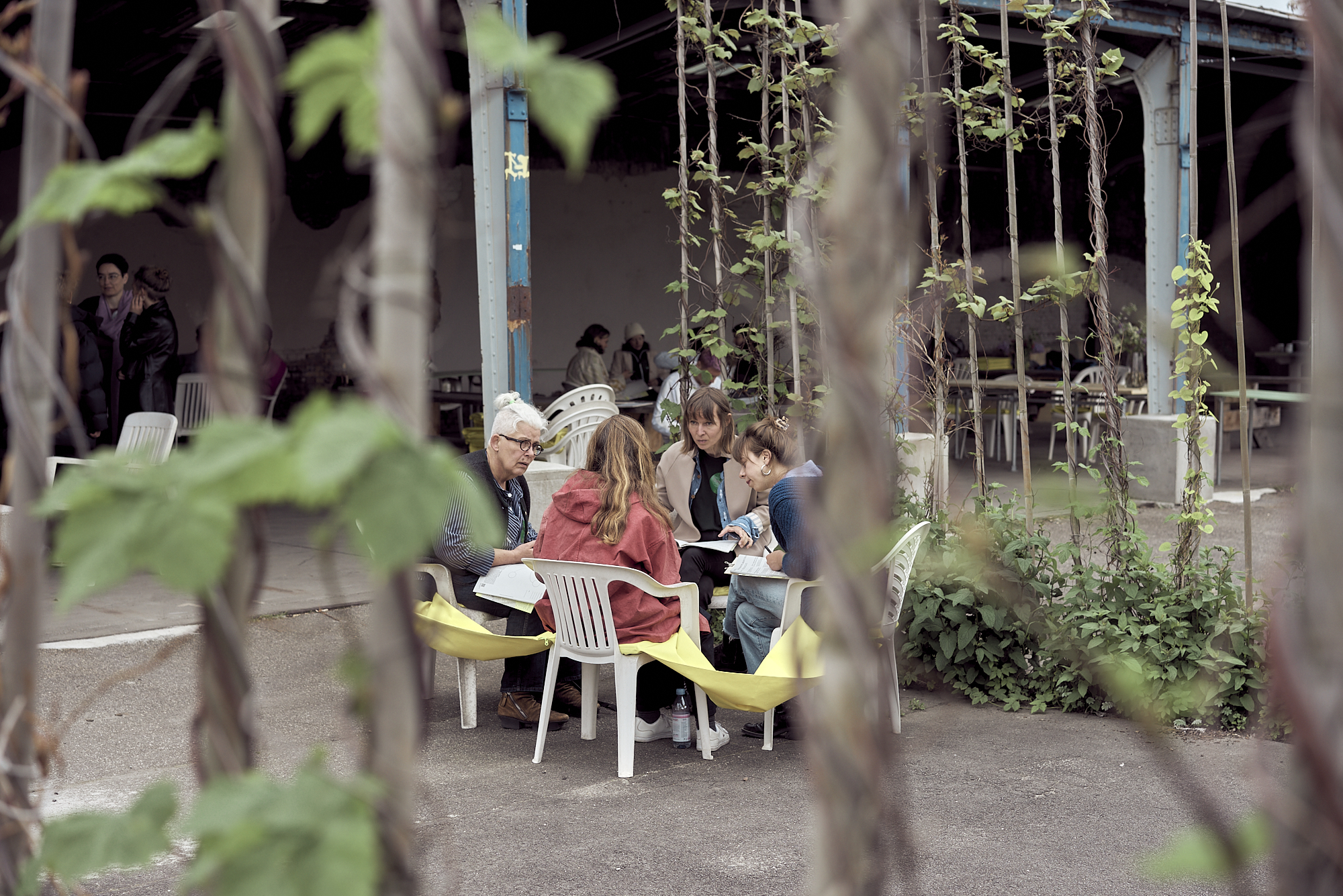How to imagine urban curating with Care?
I read the prompt "Alles ist schon da" to be an invitation to think with the complexities, contradictions, conflicts, and, at the same time, potentials and potentialities of everything that is here already, in other words, the so-called given. Today, the so-called given is a deeply wounded planet. I would like to think about everything that is already here on this deeply wounded planet from the perspective of urban curating with care.
Everything that is already here on our deeply wounded planet is marked by the aftermath of colonial, imperial, capitalist, and patriarchal violence which renders us as living with the afterlife of this violence. The term wounded speaks of the realities of causing wounds. Much of everything that is already here has, in the past, and continues at present, to wound the planet. The planet’s wounds have been caused and continue to be caused by rampant and violent extractivism, planetary urbanization and massive construction, and epistemologies of hierarchies based and rooted in coloniality, speciesism, and patriarchy.
How, then, does ‘one’ imagine urban curating with care? Who are the ‘we’ that become part of curating practiced care, fully and accurately? The term ‘one’ speaks in acknowledgment of the legacies of modern Enlightenment thought that established individualism and the idea of modern Man as independent and autonomous being. The term ‘we’ acknowledges the knowledges that are provided by feminist epistemologies, politics and ethics including decolonial, ecological, environmental, molecular, multispecies and extinction studies approaches. One is always complexly we, interdependent with and dependent upon many others, at all scales, from the cellular to the planetary. We are all the planetary beings and matters that are of and with the planet, that are dependent upon the planet and interdependent with the planet and with each other. How then does urban curating relate to the complexities of ‘we’, acknowledging that planetary wounding has resulted from splitting planetary beings into different categories of ‘we’ in biopolitical and necropolitical terms. There is still a pervasive lack of understanding what it means to be living with the afterlife of wounding and of the response-ability to the planet’s wounds. There is need for imaginaries, emotions, and knowledges to feelthink (sentipensar) the ecological and social cost of the ongoingness of wounding the planet experienced as the era of the Anthropocene defined by the conditions of climate catastrophe and mass extinction.
How then do we learn how to practice curating with care? Curare, which is the etymological root of curating, means to look after, to value, to take care of, to treat, and to cure. ‘With care’ means to feel interest and concern, means to consider something worthy of concern, but also means the efforts that are being made to do something safely. What then does it mean to practice urban curating with care in relation to everything that is already there on a deeply wounded planet? What then does it mean to consider the wounds worthy of concern? What then does it mean to make efforts to do things safely? What then does it mean to take care of, to treat, and to cure everything that is already there that has contributed to harming and wounding the planet and left behind all those planetary beings who are, precisely because of this, in more need of care and of cure? Theorist and scholar Maria Puig de la Bellacasa provided us with the thought that doing something with care leads to being exact. How then does one become exact in relation to planetary wounds that define the contemporary urban condition of life, with the urban condition not understood in opposition to the rural, but the urban understood as the condition of infrastructuralised and architecturalised modern life? Curating with care, therefore, necessarily requires research into ‘everything that is already there’ in order to connect analysis-and-transformation, theory-and-practice. Together with scholar Lara Perry, I wrote that “social and ecological struggles for a different planetary culture based on care and respect for the dignity of life are reflected in contemporary curatorial practices that explore human and non-human interdependence” and that “curatorial labour” has to be more fully understood “in the context of today’s general care crisis” and the search for “transformative work” that “allows for imagining the future of bodily, social and environmental care and the ethics of interdependency differently”.
If urban curating with care starts from the prompt that ‘everything is already here’, then working with care – that is with being exact, accurate, and precise – requires deep research and analysis of how ‘everything that is already here’ causes the lastingness and ongoingness of planetary wounding. Urban curating with care can contribute to feelthinking in a much more profound way what it means to acknowledge, to be accountable to, to be responsible to and to answer to everything is already here: the causes for wounding the planet and the potentialities for living with a wounded planet contributing to healing and curing its wounds.

How to imagine urban curating with care? Elke Krasny leads a hologram for urban curating session. Image by Antje Sauer.

How to imagine urban curating with care? Elke Krasny leads a hologram for urban curating session. Image by Antje Sauer.